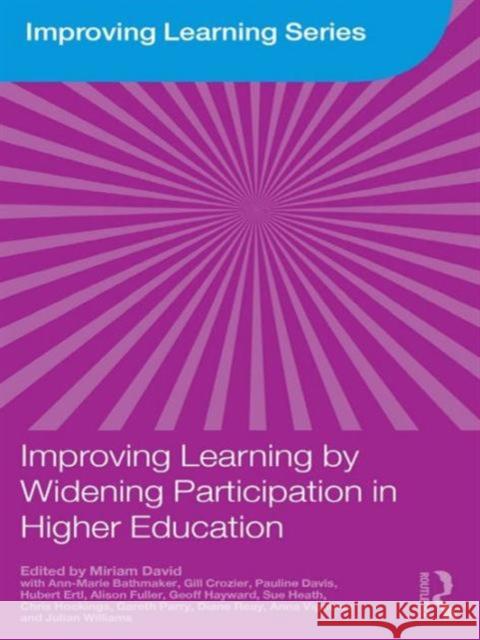Improving Learning by Widening Participation in Higher Education » książka
Improving Learning by Widening Participation in Higher Education
ISBN-13: 9780415495417 / Angielski / Twarda / 2009 / 266 str.
Improving Learning by Widening Participation in Higher Education
ISBN-13: 9780415495417 / Angielski / Twarda / 2009 / 266 str.
(netto: 698,25 VAT: 5%)
Najniższa cena z 30 dni: 654,86
ok. 16-18 dni roboczych.
Darmowa dostawa!
Improving Learning by Widening Participation in Higher Education presents a strong and coherent rationale for improving learning for diverse students from a range of socio-economic, ethnic/racial and gender backgrounds within higher education, and for adults across the life course. Edited by Miriam David, the Associate Director of the ESRC s highly successful Teaching and Learning Research Programme, with contributions from the seven projects on Widening Participation in Higher Education (viz Gill Crozier and Diane Reay; Chris Hockings; Alison Fuller and Sue Heath; Anna Vignoles; Geoff Hayward and Hubert Ertl; Julian Williams and Pauline Davis; Gareth Parry and Ann-Marie Bathmaker), this book provides clear and comprehensive research evidence on the policies, processes, pedagogies and practices of widening or increasing participation in higher education. This evidence is situated within the contexts of changing individual and institutional circumstances across the life course, and wider international transformations of higher education in relation to the global knowledge economy. Improving Learning by Widening Participation in Higher Education also considers:
- the changing UK policy contexts of post-compulsory education;
- how socio-economically disadvantaged students raced and gendered fare through schools and into post-compulsory education;
- the kinds of academic and vocational courses, including Maths, undertaken;
- the changing forms of institutional and pedagogic practices within higher education;
- how adults view the role of higher education in their lives.
The book presents a strong and coherent rationale for improving learning for diverse students from a range of socio-economic, ethnic/racial and gender backgrounds within higher education, and for adults across the life course. It considers what constitute appropriate policy contexts and changes for the post-compulsory sectors of education, to ensure a more consistent and equitable system for diverse students and across a diversity of subjects and institutions.
Written by the Associate Director of the ESRC’s highly successful Teaching and Learning Research Project (TLRP), the book provides clear and comprehensive research evidence on the policies, processes, pedagogies and practices of widening or increasing participation to higher education. This evidence is situated within the contexts of changing individual and institutional circumstances across the life course and wider international transformations of higher education in relation to the global knowledge economy.
Also considered are: the changing UK policy contexts of post-compulsory education; how socio-economically disadvantaged (raced and gendered) students fare through schools and into post-compulsory education; the kinds of academic or vocational courses undertaken (including the criticality of maths education for some subjects and forms of higher education); changing forms of institutional and pedagogic practices within higher education; how adults think about higher education in their lives.
The findings are based upon both qualitative studies and quantitative datasets. The book will appeal to policy-makers and practitioners as well as students within higher education.











